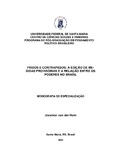| dc.contributor.advisor | Grohmann, Luis Gustavo Mello | |
| dc.creator | Ham, Jocemar van der | |
| dc.date.accessioned | 2016-09-08T12:51:09Z | |
| dc.date.available | 2016-09-08T12:51:09Z | |
| dc.date.issued | 2005-07-05 | |
| dc.date.submitted | 2005 | |
| dc.identifier.uri | http://repositorio.ufsm.br/handle/1/2122 | |
| dc.description | Monografia (especialização) - Universidade Federal de Santa Maria, Centro de Ciências Sociais e Humanas, Curso de Especialização em Pensamento Político Brasileiro, RS, 2005. | por |
| dc.description.abstract | This monographic paper focuses on verifying the dimensions of the legislative
power of the Executive intervention – with especial attention on the edition of the
provisory regulations -, in the relations with the other established Powers, and if the
Legislative Power and the Judiciary Power utilize the checking instruments in order to
impede the functional imbalance, restraining in this way the supremacy of one institution
over the others. The theories of the partition of powers and of the checks and
balances system remain updated in their concepts and applications. They are important
instruments in delimitation of institutional functions and in the control of the
power by the power. The Executive Power, making use of its legislative power constitutionally
granted by editing provisory norms in an intense and continuous manner,
reveal its supremacy before the Judiciary and the Legislative Power. The hypertrophy
of that Power is confirmed by the formation of the so called coalition governments
which have in the Legislative Power – in agreeing with the distribution of positions in
the administration – a cooperative power par excellence in the legislative activity carried
out by the Executive Power. The Judiciary Power with its focus centered in its
Supreme Court – effective guardian of the constitution – must attenuate the litigations
evolved from the addition of the referred norms, not seldom unconstitutional which hit
head-on fundamental rights. The Judiciary Power performs an extremely important role in the institutional relation and it is gaining in magnitude as the responsible for
the integrity of the constitution as an effective restrainer of the legislative abuse and,
as a final analyses, the restrainer of the possible tyranny of one power. | eng |
| dc.language | por | por |
| dc.publisher | Universidade Federal de Santa Maria | por |
| dc.rights | Acesso Aberto | por |
| dc.subject | Separação de poderes | por |
| dc.subject | Freios e contrapesos | por |
| dc.subject | Medidas provisórias | por |
| dc.subject | Relações institucionais | por |
| dc.title | Freios e contrapesos: a edição de medidas provisórias e a relação entre os poderes no Brasil | por |
| dc.title.alternative | Checks and balances: the edition of provisory regulations and the relations among the political powers in Brazil | eng |
| dc.type | Trabalho de Conclusão de Curso de Especialização | por |
| dc.degree.local | Santa Maria, RS, Brasil. | por |
| dc.degree.specialization | Pensamento Político Brasileiro | por |
| dc.description.resumo | O presente trabalho monográfico objetiva verificar as dimensões da intervenção
do poder legiferante do Executivo – com enfoque específico na edição de Medidas
Provisórias -, nas relações com os demais Poderes instituídos, e se o Legislativo
e Judiciário fazem uso dos instrumentos de checagem para impedir o desequilíbrio
funcional, refreando, assim, a preponderância de uma instituição sobre as demais.
As teorias da separação de poderes e do sistema de freios e contrapesos permanecem
atuais em seus conceitos e aplicabilidades. São instrumentos importantes na
delimitação das funções institucionais e no controle do poder pelo poder. O Executivo,
no uso de seu poder legiferante constitucionalmente conferido, ao editar normas
provisórias de forma intensa e contínua, revela supremacia ante o Judiciário e o Legislativo.
A hipertrofia daquele Poder é corroborada pela formação dos chamados
governos de coalizão que têm no Legislativo – ao convir com a distribuição de cargos
na administração -, um Poder cooperador por excelência na atividade legislativa
exercida pelo Executivo. O Poder Judiciário, com enfoque centrado em sua Suprema
Corte - efetiva guardiã da Constituição -, deve dirimir os litígios decorrentes da edição
de referidas normas, não raro inconstitucionais e que atingem frontalmente direitos
fundamentais. O Judiciário exerce papel de suma importância na relação institucional
e vem ganhando magnitude como responsável pela integridade da Carta
Magna, como efetivo refreador do abuso legislativo e, em última análise, da possível
tirania de um Poder. | por |
| dc.publisher.unidade | Centro de Ciências Sociais e Humanas | por |


